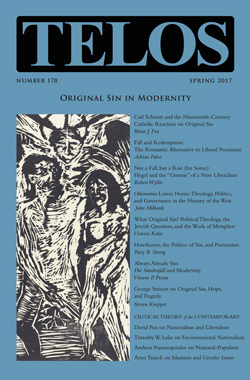Twenty-five years after the end of the Cold War, there is arguably a crisis of democracy: not only has the transition from totalitarian communism failed to bring about liberal market capitalism, but politics in mature democracies has been becoming post-democratic. Models of authoritarianism and state capitalism are spreading in different parts of the world, while countries with long-standing democratic traditions are characterized by a rejection of the political mainstream and a turn to extremes on the far left or the far right.
|
In addition to its main focus on original sin in modernity, Telos 178 (Spring 2017) features a special section of topical writing, introduced here by Russell A. Berman, that continues our ongoing commitment to setting forth a critical theory of the contemporary. Telos 178 is now available for purchase in our store.
Carl Schmitt is frequently assumed to have primarily been a Catholic intellectual, or Christian political theologian, at least until becoming alienated from the Church in the mid-1920’s. The jurist’s book Political Theology is quite logically a main source of evidence for this standard interpretation of Schmitt’s intellectual biography. However, an assumption of Schmitt’s Catholic, or even simply Christian, bona fides serves more as a distraction in understanding the origins and contours of his early thought. This mistaken narrative hides the degree to which Schmitt’s brand of secular and proto-Hobbesian decisionism is contrary to the thought of his claimed forebears among nineteenth-century counter-revolutionary Catholic theorists. Is there any genealogical connection between Christian oikonomia and modern political economy? Originally the turning of polity into household and interpersonal “pastoral” rule was not sinister but an advance. Likewise the Christian doctrines of Trinity and Incarnation resolved rather than sustained aporias of the reserved versus the economizing deity. However, later developments with the Franciscans, Palamites, and Jansenists effectively undid this resolution, producing a new “gnostic” duality. Economic rule was now sundered from ethics in a fallen world seen as utterly depraved. The heterodox discourse and practice of political economy resulted. In response to a speech given by Obama in 2013 on his administration’s counterterrorism policy, popularly referred to as his “drone speech,” General William Nash commented that Obama “has begun the transition from a perpetual war to a more normalized security framework.” I address this normalization of the categorization and control of life within a global threatscape. Much of the debate at policy level, in academia, and on the flickering screens of media outlets surrounding the contemporary fixture of the counterterror arsenal, the drone, focuses upon the legal and ethical implications. Administration officials continually stress the need for “transparency” and the president’s wish that the United States hold itself to “the highest possible standards” in the conduct of a just, humanitarian war—reminding us this is indeed a war, against an organization and its affiliates. Recent initiatives to utilize household and personal mobile technologies to further specific security, surveillance, and counter-terrorism objectives pose significant challenges to civil liberties and personal well-being. The social and political statuses of these technological systems are just emerging: they are rapidly being infused into home settings and mobile devices, apparently under the control of users but under at least the partial monitoring and operation of various governmental and corporate entities. Individuals are being increasingly surveilled by sets of security-related mechanisms in their home automation and mobile communications devices as well as by other manifestations of the “Internet of Things” (IoT). |
||||
|
Privacy Policy · Data Protection Copyright © 2026 Telos Press Publishing · All Rights Reserved |
||||



